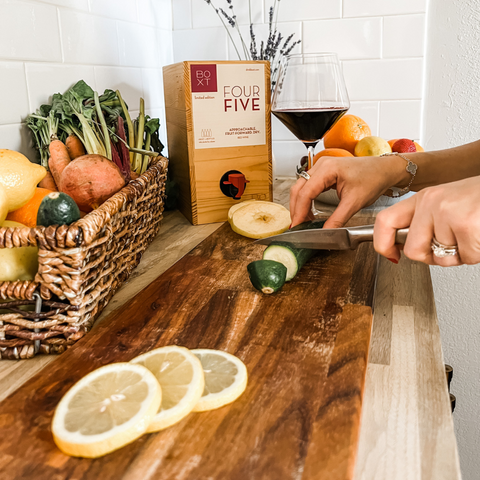
It seems obvious – wines are vegan, right? Well, maybe and maybe not. WAIT. WHAT?
Winemaking is an art and there are infinite ways to create a wine that hits all the right notes. It’s about how it feels in your mouth, the aroma, how it tastes, how it looks when you pour it. All these things are incredibly important to the winemaker, and they are equally important to the wine drinker.
Fining agents are often used to reduce bitterness caused by too many tannins, unappealing aromas or browning caused by oxidation. They can be used to help stabilize the wine, remove yeast after fermentation and to get rid of suspended particles that make a wine cloudy.
There are several vegan agents like carbon, bentonite and other clays, plant casein, silica, limestone and vegetable plaques. But fining agents can also be animal based. The most common ones used in winemaking are often byproducts of the food industry and include gelatin (the best for wine is derived from pig’s skin), casein from cow’s milk, albumin from egg whites and issinglass from a fish’s swim bladder – not the kind of bladder you’re thinking. Think of it as the little internal oxygen tank that keeps a fish buoyant without floating or sinking too much.
The idea of fining is fairly simple: Use one (or more, some are used in conjunction with one another) of the fining proteins with a negative ionic charge and it will attract the positively-charged materials you want removed from your wine. And vice versa – use a positively charged protein to remove negatively charged materials. For example, egg whites are positively charged and are used to attract the negatively charged phenols in red wines associated with too much astringency. The egg whites act like a magnet, pulling the phenols out of the wine and collecting them at the bottom of the barrel.
But here’s the thing, vegan or not, the proteins used in fining your wine aren’t still in there when you drink it, and only the tiniest trace amounts may even make it to the final product. By their very nature those proteins are there to remove unwanted particles and be removed themselves with those particles.
And wines don’t have to be fined or filtered. Left to their own timing, particles will settle, but that can take years, and depending on the grape and the winery’s commitments to vendors and the marketplace, waiting years may not be an option. As Isabelle Legeron (one of the world’s top 50 experts on wine) tells us, “Essentially, there are three options for the wine grower: time, cloudiness, or intervention.”
Because of this, there are differing opinions among winemakers on whether to fine or not, and there are lots of wines out there that are 100% unfined and unfiltered.
Here at BOXT we do fine our wines, but we don’t use animal-based fining agents. And we’re all about liking what you like – not what everyone else says you should like – so we think this is a great opportunity for a taste test.
Compare these:
- Profile One and 2018 Davis Estates Sauvignon Blanc, Calistoga, CA
- Profile Two and Dehlinger Estate Bottled Unfiltered Chardonnay, Russian River Valley, CA
- Profile Three and The Darling – “Arnst” Gewurztraminer, New Zealand
- Profile Four and Springhill Estate Unfined Unfiltered Pinot Noir, Willamette Valley, Oregon
- Profile Five and Noggle North Coast Old Long Valley Unfined & Unfiltered Cabernet Sauvignon, Clear Lake Oaks, CA
- Profile Six and Toca Madera Cabernet/Syrah (Wildlife Conservation Series), Madera, CA
Surprised we recommend other wines? We love other wines. We especially love other wines doing their thing. We fine our wines, and we’re okay with that. We’re not trying to be all the wines to everyone all the time. We’re doing our thing, which is reimagining the way we all drink fine wine at home. For us that means simplifying the whole process (we believe there should be zero hassle when it comes to wine) and delivering – straight to your door – a glass you love to drink, every single time.
If you’re a strict vegan – and we respect that – you can check what you’re drinking with the BeVeg app or at Barnivore.com. Check other beverages too, because wine isn’t the only drink (alcoholic or not) that may or may not be vegan. Beer and cider production often use animal fining agents, and many food and beverage manufacturers – think nice bright red juice drinks – use carmine (aka natural red 4) as a colorant, which is derived from the cochineal insect.
For the rest of us who may just want to do less harm and more good in the world, the question might be more about what the winery stands for overall. How do they give back? How socially or environmentally responsible are they? Other winemakers might use non-vegan fining agents, but the good they do in other areas may outweigh that if you’re on the fence. A big part of why we produce and package wine the way we do is to reduce our carbon footprint and make an impact in the industry as a winery that cares about the environment. We also plant a tree for every BOXT we make. Because it’s important to us to make sure we’re giving back while we make a wine that exceeds expectations, every single time.
Use code: UNBOXT for $20 off your first order
SHOP OUR WINES >>>
 Skip to content
Skip to content
